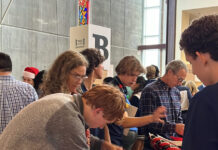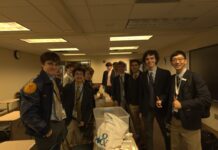A child asked his father, “How were people born?” So his father said, “Adam and Eve made babies, then their babies became adults and made babies, and so on.” The child then went to his mother and asked her the same question. She replied, “We were monkeys then we evolved to become like we are now.” The child ran back to his father and exclaimed, “You lied to me!” His father replied, “No, your mom was talking about her side of the family.”
Many similar jokes, like the one featured above, will fill the Lecture Hall, causing a raucous of laughter, during Jesuit’s inaugural comedy event Hilarity for Charity. This stand-up comedy event will be the opening act for Jesuit’s Film Festival and be hosted on two nights: Friday, May 8th and Saturday, May 9th.
Hilarity for Charity was the brainchild of Mitchell Opatowski ‘15, who recruited the help of Stetson McGahey ’15 and Parker Allen ’17. The trio developed the project to its present incarnation, during their daily “conferences” in the theology commons. According to the group, “Jesuit Hilarity for Charity (JHFC) is a new Jesuit event that is a humor-based variety show performed exclusively by Jesuit faculty, but managed by the students, who will donate its earnings to Heart Gift.” The organization Heart Gift is a program that Jesuit has partnered with to help raise funding for life-saving surgeries offered to children in third world countries, children who have specific heart conditions. Through the help of the comedy show and other student led programs, Jesuit is able to successfully raise money to sponsor these children.
The idea to have a comedy show occurred to Mitchell after witnessing all of the good-humored jokes tossed around by Mr. Hanley, Mr. Dondis, Mr. Kolker and many other teachers on a daily basis. Mitchell often wondered what it would be like to view the faculty outside of their “natural habitats doing what they do best…making us laugh.” Quickly, he realized the possibility of transforming this dream into a reality and, with the help of his friends, began to evolve project into something bigger.
The first order of business for the group was to discover who would lead the faculty in their comedy skits. Of course, Mitchell and his peers logically sought the leadership of Mr. Kolker because he, “already having a background in comedy, was an obvious choice.” Mr. Kolker replied that his position is “to help [Mitchell, Parker, and Stetson], and to help put together what we hope to be a fun-filled and entertaining evening.” In addition to Mr. Kolker, Mr. Dondis has agreed to the perform in the show and is “extremely enthusiastic about it.” With the event roughly three weeks away, the group is still finalizing the list of performers and participants, but so far “Mr. Nava and Mr. Lugo have agreed to play music during the show, Mr. J Howard has been working on marketing, and Mr. Myers will lend his hand in the logistics of the show.”
The second order of business for the group was to determine who the intended audience would be. Mitchell hopes that “Anyone in the Jesuit community including students, family members, and other faculty members” will attend and are encouraged to “come, laugh, and donate.”
Following this idea, another goal of Mitchell’s is to attract students at Jesuit who do not normally attend theater performances in the Lecture Hall. He confessed that, “I have never been to a show, partly because I am so busy, but also because I feel like I wouldn’t fit in or enjoy it.” Thus, Mitchell can relate to those who are hesitant about seeing the show and hopes that the JHFC event will provide students with an opportunity to enjoy a new and unfamiliar experience. Even if the idea of stepping outside your comfort zone sounds slightly intimidating, the chance to participate in this debut might convince you otherwise, making Jesuit history.
Finally, Mitchell hopes that the comedy show will strengthen the relationship between students and their teachers. If “the faculty express themselves and give themselves an identity,” students will likely become more open to making connections with faculty earlier on in their high school career. Ultimately, Mitchell expects this event to eliminate any “misconceptions” students may have of teachers as being “supervisors.”
Looking forward to this lasting tradition at Jesuit, Mitchell concludes, “We will shoot to make this show enjoyable and long lasting and be a tremendous success,” hoping that the underclassmen will become “inspired to maintain the project in our legacy.”






